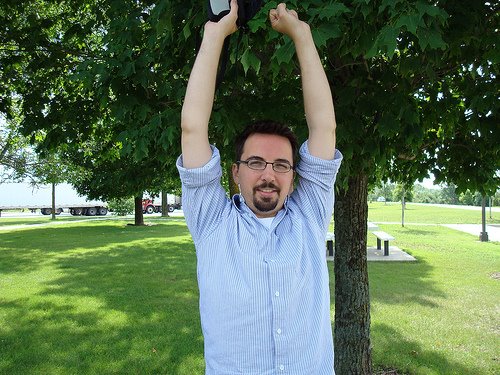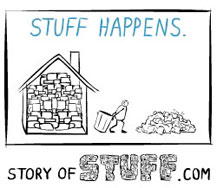Kiva is a really interesting site and if you are looking for something different to do in your classroom this Holiday season, you might want to check it out. Kiva puts you in touch with small businesses and entrepreneurs in developing countries. It explains their business and the amount of money required for their loan.
Individuals then put up 25, 50, 100 or more dollars towards the cost of the project. Loan payments are then payed back over a particular schedule.
I won't say this very often on this blog - but I heard about Kiva from Oprah so it's received a certain amount of press recently. But spread the word and take a look through some of the projects. Also if you are not convinced about the power of Microcredit, read Banker to the Poor by Muhammad Yunis.
So before you hold a secret Santa in your classroom this year, think about how that $10 gift could go a lot further for someone in a developing country.
Wednesday, November 28, 2007
Wednesday, November 21, 2007
Bilaal Rajan, World Saver and Blogger Extraodinaire
Bilaal Rajan is one amazing Canadian. At age 4 he started raising funds to help earthquake survivors in India. What started with $350 dollars has grown into a host of charitable events over the years that you can read all about. In 2005 he was named Canada's UNICEF National Child Representative.
This past month he was the featured speaker at the Nova Scotia Social Science Teachers Association conference in Brookfield, NS. His work is an inspiration to thousands of Canadians, both young and old.
Why does this quality as a Digital History Education story though. Bilaal blogs on his own site, http://www.bilaalrajan.com/. If Bilaal can blog about all the work that he is doing, than surely your classroom can start a blog as well. Started this past summer, his blog follows his exploits and seeks to inspire others.
This holiday season take a few moments to read about Bilaal in your class, you never know what might be inspired.
This past month he was the featured speaker at the Nova Scotia Social Science Teachers Association conference in Brookfield, NS. His work is an inspiration to thousands of Canadians, both young and old.
Why does this quality as a Digital History Education story though. Bilaal blogs on his own site, http://www.bilaalrajan.com/. If Bilaal can blog about all the work that he is doing, than surely your classroom can start a blog as well. Started this past summer, his blog follows his exploits and seeks to inspire others.
This holiday season take a few moments to read about Bilaal in your class, you never know what might be inspired.
Friday, November 16, 2007
PB Presentation WIKI
The History Society has been on the road for the last few weeks presenting at the Nova Scotia SSTA, OHASSTA and the Teachers Institute on Canadian Parliamentary Democracy in Ottawa. It has been great to have an opportunity to meet teachers face to face and talk about Canada's National History Society and the fun digital projects that we are trying to get started.
To try and make things more exciting, we are experimenting with using a Wiki this year for our presentation. You can find our presentation Wiki at digitalhistory.pbwiki.com. If we are going to encourage teachers to use digital programs in their classroom, then the least we should do it use them ourselves in our presentations and projects.
I want to also stress the non-linear nature of the Wiki and what that means for historians. Critical thinking is about moving away from a linear view of the past towards something far greater and engaging. A Wiki gives students the opportunity to see how things are interconnected by linking material through different pages. You can also easily integrate other online programs to make your presentation more engaging.
I admit using a Wiki for a presentation is a bit unorthodox, but everyone has to start somewhere. As more teachers hopefully start their own classroom Wiki's we will have more examples to share with educators.
To try and make things more exciting, we are experimenting with using a Wiki this year for our presentation. You can find our presentation Wiki at digitalhistory.pbwiki.com. If we are going to encourage teachers to use digital programs in their classroom, then the least we should do it use them ourselves in our presentations and projects.
I want to also stress the non-linear nature of the Wiki and what that means for historians. Critical thinking is about moving away from a linear view of the past towards something far greater and engaging. A Wiki gives students the opportunity to see how things are interconnected by linking material through different pages. You can also easily integrate other online programs to make your presentation more engaging.
I admit using a Wiki for a presentation is a bit unorthodox, but everyone has to start somewhere. As more teachers hopefully start their own classroom Wiki's we will have more examples to share with educators.
Thursday, November 15, 2007
Paul Keery's Podcast Presentation
At OHASSTA this year I had the opportunity to attend Paul Keery's presentation on Podcasting in the classroom. Paul has been at it a while now and has put together an impressive package of results. He has also generously provided a copy of his powerpoint presentation and examples of student work on his website.
I would strongly suggest taking a moment to check out his website and his material. He also has a fun classroom website going as well. One of the real benefits to these conferences is the opportunity to meet fellow educators working on digital history projects. It's great to have a real example of classroom success. I'm also adding a link to all of Paul's material on the sidebar.
Keep up the great work Paul!
I would strongly suggest taking a moment to check out his website and his material. He also has a fun classroom website going as well. One of the real benefits to these conferences is the opportunity to meet fellow educators working on digital history projects. It's great to have a real example of classroom success. I'm also adding a link to all of Paul's material on the sidebar.
Keep up the great work Paul!
Tuesday, November 06, 2007
National Forum on Canadian History
Over the past few weeks we have been working really hard at the History Society getting ready for the first National Forum on Canadian History that was held this past Friday (November 2, 2007).
As part of the conference, we wanted to create an easy place for teachers to retrieve documents and keep up to date on the proceedings. In stepped Pageflakes, a program that is really handy for online conferences and that would be great in a classroom.
It's a little more flashy then a regular blog as it allows you to have all of your content up and live. The real trick to getting this going is creating lists with appropriate tags so you can have multiple users sending content (blog entries or homework) to the same sections. I was introduced to pageflakes through another online conference, The Future of Education, back in July.
Check out the pageflakes page we put together for the National Forum on Canadian History that was hosted by the Governor General of Canada. You can also find copies of the presentations and I'm just uploading photos of the event now.
I've also put together a digital history education pagecast that I'm going to continue building on.
As part of the conference, we wanted to create an easy place for teachers to retrieve documents and keep up to date on the proceedings. In stepped Pageflakes, a program that is really handy for online conferences and that would be great in a classroom.
It's a little more flashy then a regular blog as it allows you to have all of your content up and live. The real trick to getting this going is creating lists with appropriate tags so you can have multiple users sending content (blog entries or homework) to the same sections. I was introduced to pageflakes through another online conference, The Future of Education, back in July.
Check out the pageflakes page we put together for the National Forum on Canadian History that was hosted by the Governor General of Canada. You can also find copies of the presentations and I'm just uploading photos of the event now.
I've also put together a digital history education pagecast that I'm going to continue building on.
Subscribe to:
Posts (Atom)






